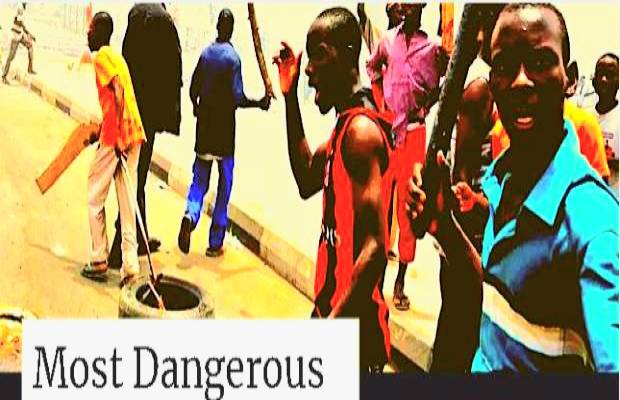Top 8 Most Insecure States In Nigeria 2024

In recent years, Nigeria has witnessed an increase in cybercrime, armed robberies, kidnappings, terrorism, and violence amongst communities. To combat crime and improve security, the Nigerian government has implemented a variety of measures, such as increasing police presence, providing financing for security infrastructure, and collaborating with international partners.
However since crime is still a major issue in Nigeria, citizens must exercise vigilance and adopt the necessary safety measures to guard against criminal activities. Security has usually declined in various states and regions of Nigeria as a result of insurgency, banditry, inter-communal conflicts, and other violent crimes. When there is a high risk, it is best to avoid certain areas and proceed with caution. Nigeria's most unstable states are these.
Top 8 Most Insecure States in Nigeria 2024
- Borno
- Yobe
- Adamawa
- Kaduna
- Zamfara
- Kastina
- Sokoto
- Plateau
1. Borno State
Borno State has been dealing with significant and persistent security problems, primarily as a result of the activities of insurgent groups, the most prominent of which is Boko Haram. The political, social, and historical underpinnings of Borno's security issues are extensive. Decades of economic disparity, political marginalization, and underdevelopment have created an environment that is ripe for radicalization, one of dissatisfaction and vulnerability. The intricate relationships between economic, religious, and ethnic influences make for a complex security situation.
Borno's porous borders have exacerbated the issue by allowing rebels to wander freely and acting as a hub for violent crimes, kidnappings, and mass displacements. In addition to immediate security measures, sustained initiatives in socioeconomic development, education, and community involvement are necessary to address the root causes and create the foundation for enduring peace.
2. Yobe State
Yobe State, Borno's neighbour, is also threatened by the Boko Haram insurgency in terms of security. The state has a sense of heightened insecurity as a result of resident relocation, kidnappings, and attacks on schools. Due to the socioeconomic conditions of Yobe, which are marked by great poverty, poor infrastructure, and economic vulnerability, certain populations are more susceptible to being used by rebel groups. The region's open borders increase security dangers, thus ongoing efforts to improve security procedures and address the underlying socioeconomic problems are required.
READ ALSO » Top 13 Richest States In Nigeria 2023
Programs that increase educational standards, increase community resilience, and give access to economic possibilities are all necessary components of a comprehensive strategy for Yobe. By addressing both the current security challenges and the underlying socio-economic issues, a more comprehensive and successful approach might be put into action.
3. Adamawa State
Adamawa State is coping not only with the aftermath of the Boko Haram insurgency but also with isolated conflicts inside communities. Despite being a source of wealth, the state's distinct ethnic and religious composition has periodically caused strife and sporadic violent outbursts. Poverty and limited access to education are two socioeconomic factors that contribute to the security environment's complexity.
Substantial security measures alone won't solve Adamawa's instability; instead, a sophisticated, situation-specific plan is required. Implementing targeted interventions is essential to righting historical wrongs, promoting social cohesion, and providing chances for economic growth. Engaging in sustainable socio-economic development and lending support to community-led projects can help cultivate enduring peace.
4. Kaduna State
Numerous security issues face Kaduna State, like intercommunal violence, banditry, and ethno-religious conflicts. Because of its strategic importance and diverse population, the state is susceptible to a variety of violent acts. The security situation is made more complex by past conflicts between religious and ethnic groups, the struggle for resources, and economic inequalities.
It is possible to effectively combat the instability in Kaduna by strengthening security protocols, fostering inter-communal contact, putting programs in place to close economic disparities, and promoting inclusion. By addressing the underlying socioeconomic problems as well as the current security concerns, a more comprehensive and durable peace may be achieved.
5. Zamfara State
The main security threats facing Zamfara State are attacks on civilian targets and banditry. The state faces several challenges, such as poor economic conditions, inefficient law enforcement, and territorial and resource disputes. High-profile kidnapping instances in Zamfara, particularly those involving children, highlight the urgency of resolving security-related issues.
By stepping up security, including the community, promoting economic recovery, and implementing initiatives to address root causes of conflict, Zamfara is combating instability. By building avenues for socioeconomic development, fostering community resilience, and implementing focused security measures, Zamfara may help create a more stable and secure future.
6. Kastina State
READ ALSO » 3 Poverty Dominated States In Nigeria
The northwest Nigerian state of Katsina has had several security problems, chief among them raids on villages and banditry. With shared borders with Zamfara, a state dealing with similar issues, Katsina has a complex and volatile security situation. The confluence of historical grudges, economic disparities, and shortcomings in law enforcement has fostered an environment conducive to banditry.
Mass kidnappings are a troubling phenomenon that has affected schools particularly and underscored the urgency of security concerns in the state. Improved security measures, such as community policing and intelligence-driven operations, are crucial to addressing the instability in Katsina. Furthermore, it is crucial to foster community involvement and resiliency.
7. Sokoto
The well-known security problems in Sokoto are a result of banditry and intercommunal conflict. The state's proximity to border regions exacerbates its security issues. Economic factors, such as limited resources and competition for available opportunities, impact the complicated security environment. Additionally, how communities perceive and respond to security threats is influenced by historical and cultural variables. The insecurity in Sokoto needs to be addressed with a tailored, scenario-specific plan.
Strategies should incorporate urgent security measures, such as intelligence-driven operations and border control initiatives. Addressing the economic reasons of insecurity at the same time requires initiatives for socioeconomic growth. Cultural sensitivity and historical context are important considerations to ensure that interventions are effective and well-received by the communities in which they are implemented.
8. Plateau State
In Plateau State, conflicts involving farmers and herders as well as ethnic and religious disagreements are frequent occurrences. Rivalry for resources, particularly land, has contributed to the state's diverse population. Historical disputes affect both urban and rural areas, often resulting in violent outbursts between communities. Because of the complexity of insecurity in the Plateau, a multifaceted and comprehensive approach is required.
Two strategies to enhance security,, in general are to make law enforcement agencies more capable of responding swiftly to emerging threats and to maintain a conspicuous presence in high-risk areas. Long-term peace in this state will depend greatly on community initiatives that promote collaboration, understanding, and tolerance.
